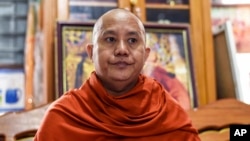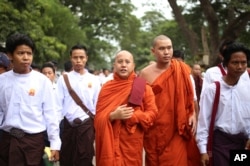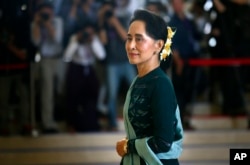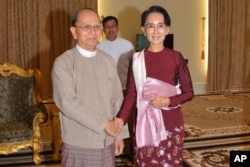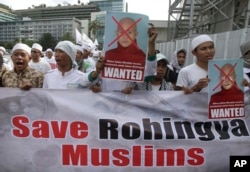The Myanmar nationalist monk Wirathu has long used vile language to make a point.
In January 2015, he called Yanghee Lee, the United Nations special rapporteur for human rights in Myanmar, a "whore." In an interview with 60 Minutes that aired in October the same year, he said that Muslims, who make up less than 5 percent of the population here, were defecating on the country.
Government attitude changes
Under the previous military-backed administration of President Thein Sein, Wirathu received little pushback for his remarks, often delivered in public sermons or broadcast on his popular Facebook page.
After Aung San Suu Kyi's National League for Democracy came to power almost a year ago, however, this hands off approach changed.
In July 2016, the country's Buddhist leadership distanced itself from the nationalist entity affiliated with Wirathu, the Committee to Protect Race and Religion, after a senior NLD official said the group was not necessary.
Earlier this month, religious officials banned Wirathu from preaching for one year after he took to Facebook to thank the suspects accused of murdering government adviser Ko Ni in January and, in a later incendiary speech, told women it was better to marry dogs than Muslims.
But while he may be silent for now, his legacy of hatred and political Buddhism remains.
"Normally when the Buddhist monks give sermons, it was not about politics, but about religion for the personal liberation, to attain Nirvana, to attain enlightenment, and how to live a proper religious life," said Soe Myint Aung, an analyst with The Tagaung Institute of Political Studies in Yangon.
'Framed the discourse'
But Wirathu and other political monks "framed the discourse" around the protection of Buddhism and the need to be afraid of others, Soe Myint Aung said, adding that silencing him won't erase his influence.
"It is a delicate situation, because now that he has got many followers, there are certainly people and organizations that idolized him, that respected him. So removing his discourse and his personality will not be that easy," Soe Myint Aung added.
Wirathu's career predates Myanmar's transition to democracy in 2011, when the army put forward a quasi-civilian government with former military men at the helm. He was jailed in 2003 for incitement and may well have remained an obscure figure had he not been released in an amnesty in 2012.
With the help of an expanding telecommunications network, he contributed to fueling the rise of Buddhist nationalist groups, such as the 969 movement and the Committee to Protect Race and Religion, both of which spawned a network of smaller organizations inspired by messages of intolerance and Islamophobia.
Using his monastery in Mandalay as a sort of war room, he amassed supporters and admirers while becoming the go-to person for journalists hoping to understand Myanmar's radical Buddhists.
Rohingya Muslims a special target
He stirred up hatred against Rohingya Muslims in Rakhine State, helping push the narrative that they are not citizens of Myanmar but immigrants from Bangladesh. The Rohingya have lived in internal displacement camps since inter-communal violence broke out in Rakhine in 2012, killing hundreds.
Many believe Wirathu's speeches and comments fanned the flames of conflict between Buddhists and Muslims. Today, hate speech against Muslims is common online.
In 2015, Wirathu backed a series of "race and religion" laws that rights groups criticized for being discriminatory against Muslims. While barely enforced, they are still on the books.
He waded into the 2015 election, backing Thein Sein, who's party lost to Aung San Suu Kyi's in a landslide. But critics say the influence of nationalist groups pressured the NLD into not fielding Muslim candidates for parliament, pushing them further from political life.
David Mathieson, an independent analyst based in Yangon, said Wirathu punctured the impression the international community had of Buddhism in Myanmar, exposing darker sides that were not so evident during the celebrated Saffron Revolution in 2007, when monks faced off against the military.
But Mathieson emphasized it was important not to overstate Wirathu's influence. He didn't create Buddhist nationalism, he simply tapped into it to elevate his own position.
"I think domestically his legacy is going to be that he was a selfish opportunist," he said. "He was a man of his time. There were increased tensions over the ways the transition was going, it was after 2012, and like the opportunist he is, he took advantage of it."
Wirathu did not return several phone calls seeking comment. An official from the Ministry of Religious Affairs also declined to comment, while others in the ministry could not be reached.
But a senior member of the Committee to Protect Race and Religion, which goes by the acronym Ma Ba Tha, said that while the ban on Wirathu was due to his penchant for hate speech, it would not affect support for the nationalist movement.
"No matter who will get banned, this will be the same," Maung Maung, a member of Ma Ba Tha's Central Executive Committee, said. "It is obvious in the history that people already have this idea."
And it doesn't look like Wirathu has plans to disappear entirely. After the order was issued, he posted a video of himself with tape over his mouth while a recorded sermon played in the background.
The country's Buddhist leadership has said he could face legal action if he continues topost the taped sermons, but the stunt shows that he won't be going quietly.
Aung Naing Soe contributed to this report.




